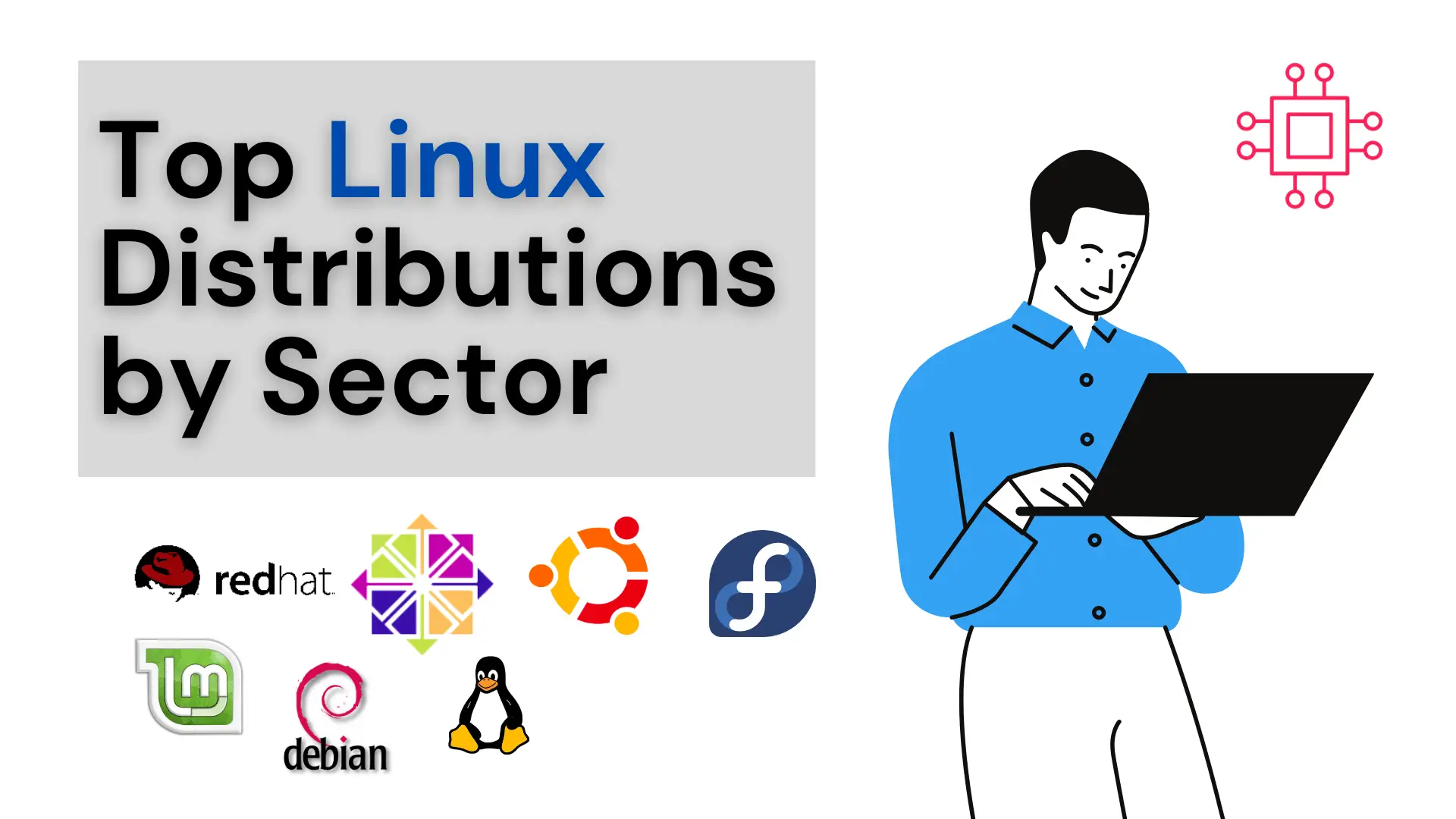
In this article, we will review the process for creating snapshots in KVM. As part of this process, we will learn how to script this

Linux is a popular and versatile operating system. In this article, we will examine the top Linux distributions by sector and specifically, the consumer, commercial, and enterprise sectors.
As of 2021, Linux has a worldwide market share of around 2.3%, but it is still one of the most popular operating systems for servers, embedded systems, and other specialized applications. There are many different Linux distributions available, each with its own unique features and user base. In each sector, there are different Linux distributions that are more popular and better suited for different use cases. In this article, we will rank the top 5 Linux distributions in each sector, based on various factors such as popularity, utility, and overall demand.

When it comes to the consumer sector, the most popular Linux distributions tend to be those that are easy to use and provide a range of applications and features that are popular with home users. Here are the top 5 Linux distributions in the consumer sector, based on data from DistroWatch and other sources:
Linux Mint stands out as a widely embraced Linux distribution appreciated for its user-friendly interface and straightforward usage. Tailored for the consumer sector, it boasts an array of features and tools, making it exceptionally well-suited for home users.
Within Linux Mint, users can access a diverse set of applications and features catering to the preferences of home users. This includes a spectrum of multimedia tools, software designed for efficient photo and video management, and an assortment of productivity tools. Noteworthy is Linux Mint’s reputation for providing excellent support and abundant resources to enhance the user experience.
Ubuntu, a widely favored Linux distribution, distinguishes itself with its intuitive interface and user-friendly design, making it a top choice for the consumer sector, particularly for home users.
Setting Ubuntu apart are its distinctive features and tools tailored to enhance the home user experience. This encompasses a diverse set of applications, including multimedia tools for immersive content experiences, specialized software for efficient photo and video management, and an assortment of productivity tools. Notably, Ubuntu is recognized for its exceptional support infrastructure and abundant resources, further enriching the user journey.
Pop!_OS has secured its popularity as a Linux distribution celebrated for its user-friendly design and seamless usability, making it an optimal choice for the consumer sector, particularly home users.
What sets Pop!_OS apart are its distinctive features and tools curated to elevate the home user experience. This encompasses a diverse array of applications, featuring multimedia tools for immersive content engagement, specialized software dedicated to efficient photo and video management, and a suite of productivity tools. Noteworthy is Pop!_OS’s reputation for delivering excellent support and a wealth of resources, further enhancing the overall user satisfaction.
MX Linux is a popular Linux distribution that is known for its stability and reliability. It is well-suited for use in the consumer sector, with a range of features and tools that make it ideal for home users.
MX Linux provides a range of applications and features that are popular with home users, including a variety of multimedia tools, software for managing photos and videos, and a range of productivity tools. It is also known for its excellent support and resources for users.
Manjaro stands out as a favored Linux distribution, celebrated for its user-friendly interface and seamless usability, making it a prime choice for the consumer sector, particularly for home users.
What distinguishes Manjaro are its unique features and tools meticulously designed to optimize the home user experience. This encompasses a diverse suite of applications, featuring multimedia tools for immersive content engagement, specialized software for efficient photo and video management, and an array of productivity tools. Notably, Manjaro is renowned for delivering exceptional support and abundant resources, contributing to an enriched user journey.
In the commercial sector, Linux is used by a variety of businesses and organizations for a range of purposes, including web hosting, data processing, and software development. Here are the top 5 Linux distributions in the commercial sector, based on data from DistroWatch and other sources:
Red Hat Enterprise Linux (RHEL) is a popular Linux distribution that is well-suited for use in the commercial sector. It is known for its stability, security, and support, and is used by a range of businesses and organizations for a variety of purposes.
RHEL provides a range of features and tools that are popular in the commercial sector, including support for virtualization, containerization, and cloud computing. It is also known for its excellent support and resources for users, including comprehensive documentation and a large community of users and developers.
CentOS, a prominent Linux distribution rooted in RHEL, has carved its niche in the commercial sector, celebrated for its unparalleled stability, security features, and robust support infrastructure. It serves as the preferred choice for a myriad of businesses and organizations, catering to diverse needs.
What sets CentOS apart are its distinctive features and tools tailored to meet the demands of the commercial sector. This includes robust support for virtualization, containerization, and cloud computing, aligning seamlessly with contemporary business requirements. The distribution is renowned for its exceptional support system, offering comprehensive documentation and a vibrant community of users and developers.
As per the W3Techs web server survey conducted in December 2021, CentOS holds the distinction of being the second most popular Linux distribution for web servers, boasting a substantial market share of 24.1%. In this ranking, CentOS is surpassed only by Ubuntu at 39.2%, with Debian following closely at 16.9%.
Ubuntu LTS (Long Term Support) emerges as a sought-after Linux distribution, tailor-made for seamless integration into the commercial sector. Renowned for its steadfast stability, robust security measures, and unparalleled support, Ubuntu LTS has become the preferred choice for a diverse array of businesses and organizations, catering to multifaceted needs.
The distinctive allure of Ubuntu LTS lies in its unique features and tools meticulously designed to elevate the commercial experience. This encompasses robust support for virtualization, containerization, and cloud computing, aligning effortlessly with the evolving technological landscape of businesses. The distribution’s outstanding support system extends beyond conventional norms, offering users comprehensive documentation and fostering a vibrant community of engaged users and developers.
Ubuntu LTS stands as a testament to its prominence, validated by its substantial presence in the commercial sector. Its reputation is further reinforced by its steadfast market share, a testament to its influence in meeting the demands of commercial users across diverse purposes.
Debian, a celebrated Linux distribution, emerges as an ideal choice for the commercial sector, renowned for its unwavering stability, robust security measures, and extensive support infrastructure. Embraced by businesses and organizations with diverse objectives, Debian stands out as a versatile solution in the realm of Linux distributions.
What sets Debian apart are its distinctive features and tools meticulously curated to cater to the dynamic needs of the commercial landscape. This encompasses robust support for virtualization, containerization, and cloud computing, aligning seamlessly with the evolving technological requirements of businesses. Debian’s stellar support system transcends the ordinary, offering users comprehensive documentation and fostering a vibrant community comprising dedicated users and developers.
Debian’s influence in the commercial sector is underscored by its steadfast market presence, affirming its position as a reliable and versatile choice for businesses and organizations seeking a Linux distribution that goes beyond conventional standards.
SUSE Linux Enterprise, a widely embraced Linux distribution, stands out as an optimal choice for the commercial sector, distinguished by its exceptional stability, robust security measures, and unwavering support. Trusted by a diverse spectrum of businesses and organizations, SUSE Linux Enterprise excels in addressing varied objectives within the commercial landscape.
The distinctive edge of SUSE Linux Enterprise lies in its unique features and tools thoughtfully curated to meet the dynamic demands of the commercial environment. This encompasses robust support for virtualization, containerization, and cloud computing, aligning seamlessly with the evolving technological landscape of businesses. SUSE Linux Enterprise’s commitment to support goes beyond the ordinary, offering users comprehensive documentation and fostering a robust community composed of dedicated users and developers.
The enduring popularity of SUSE Linux Enterprise in the commercial sector attests to its reliability and adaptability, making it a standout choice for businesses and organizations seeking a Linux distribution with features that elevate it above conventional standards.
In the enterprise sector, Linux is used by a variety of businesses and organizations for a range of purposes, including web hosting, data processing, and software development. Here are the top 5 Linux distributions in the enterprise sector, based on data from DistroWatch and other sources:
Red Hat Enterprise Linux (RHEL) is the most popular Linux distribution in the enterprise sector, and for good reason. It is known for its stability, security, and support, and is used by a range of businesses and organizations for a variety of purposes. RHEL is often the go-to choice for large enterprises that require a highly stable and secure operating system for their mission-critical applications.
RHEL provides a range of features and tools that are popular in the enterprise sector, including support for virtualization, containerization, and cloud computing. It is also known for its excellent support and resources for users, including comprehensive documentation and a large community of users and developers.
CentOS is a popular Linux distribution that is based on RHEL and is well-suited for use in the enterprise sector. It is known for its stability, security, and support, and is used by a range of businesses and organizations for a variety of purposes.
CentOS provides a range of features and tools that are popular in the enterprise sector, including support for virtualization, containerization, and cloud computing. It is also known for its excellent support and resources for users, including comprehensive documentation and a large community of users and developers.
Debian, a prominent Linux distribution, emerges as a favored choice for the enterprise sector, celebrated not only for its stability, security, and support but also for its distinctive features that cater to diverse needs of businesses and organizations.
What sets Debian apart are its unique features and tools meticulously crafted to address the intricate requirements of the enterprise environment. This includes robust support for virtualization, containerization, and cloud computing, positioning Debian as a versatile solution aligned with the evolving technological landscape of enterprises. Beyond its technical strengths, Debian is renowned for its exceptional support system, offering users comprehensive documentation and fostering a vibrant community of engaged users and developers.
In the realm of enterprise computing, Debian shines as a Linux distribution that goes beyond conventional norms, offering a suite of features that elevate its utility and adaptability for businesses and organizations with multifaceted purposes.
SUSE Linux Enterprise, a Linux distribution of significant acclaim, stands as an ideal choice for the enterprise sector, not just for its inherent stability, security, and support but also for the distinctive features that set it apart in the realm of business and organizational computing.
What distinguishes SUSE Linux Enterprise are its unique features and tools meticulously designed to meet the intricate demands of the enterprise landscape. This encompasses robust support for virtualization, containerization, and cloud computing, positioning SUSE Linux Enterprise as a cutting-edge solution attuned to the evolving technological needs of enterprises. Beyond its technical prowess, SUSE Linux Enterprise is recognized for its exceptional support system, offering users comprehensive documentation and fostering a sizable community of engaged users and developers.
In the diverse tapestry of enterprise computing, SUSE Linux Enterprise rises as a Linux distribution that not only upholds stability, security, and support but also brings a suite of features that elevate its utility, making it a standout choice for businesses and organizations with varied objectives.
Oracle Linux, a widely embraced Linux distribution, distinguishes itself as an optimal choice for the enterprise sector, renowned not only for its stability, security, and support but also for the unique attributes that set it apart in the landscape of business and organizational computing.
Setting Oracle Linux apart are its distinctive features and tools meticulously designed to meet the intricate demands of the enterprise environment. This encompasses robust support for virtualization, containerization, and cloud computing, positioning Oracle Linux as an advanced solution finely attuned to the evolving technological needs of enterprises. Beyond its technical prowess, Oracle Linux is recognized for its exceptional support system, offering users comprehensive documentation and fostering a substantial community of engaged users and developers.
In the diverse realm of enterprise computing, Oracle Linux stands out by not just adhering to standards of stability, security, and support but by bringing a suite of features that elevate its uniqueness. It remains a standout choice for businesses and organizations seeking a Linux distribution that combines reliability with a distinct set of tools and capabilities tailored to varied objectives.
In conclusion, the Linux community has a wide range of users with varying needs, goals, and backgrounds. Therefore, it’s used by individuals, businesses, and organizations for a wide range of purposes. The top 5 Linux distributions in each of the consumer, commercial, and enterprise sectors provide a range of features and tools that are well-suited to the needs of their respective user bases.
In the consumer sector, Linux Mint and Ubuntu are the most popular distributions, followed by MX Linux, Pop!_OS, and Manjaro. In the commercial sector, Red Hat Enterprise Linux is the most popular distribution, followed by CentOS, Debian, SUSE Linux Enterprise, and Oracle Linux. In the enterprise sector, Red Hat Enterprise Linux is the most popular distribution, followed by CentOS, Debian, SUSE Linux Enterprise, and Oracle Linux.
Overall, the popularity and success of Linux can be attributed to its open-source nature, flexibility, stability, security, and the support of a large and dedicated community of users and developers.
Related Posts

In this article, we will review the process for creating snapshots in KVM. As part of this process, we will learn how to script this

In this article, we will review installing and using Git on Linux machines. Besides minor differences in syntax, the install commands and procedures are similar

In this tutorial, we will review the Kubernetes cluster install on CentOS8. This procedure will mirror our previous article about this subject. Install a Kubernetes
